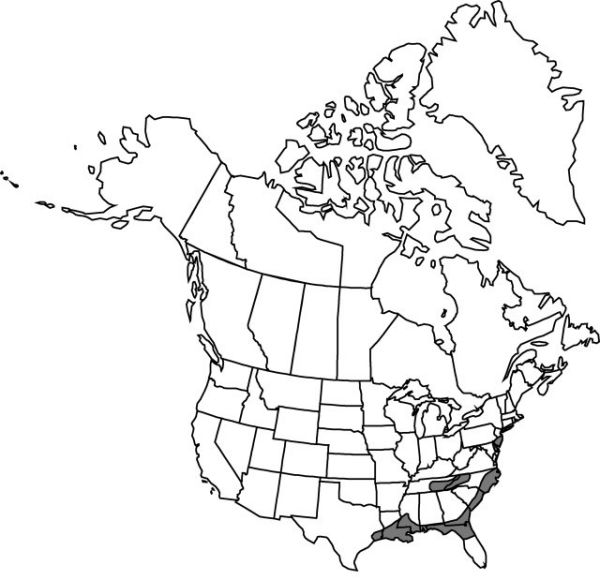Difference between revisions of "Platanthera integra"
Bot. North. Middle States ed. 2, 348. 1848.
FNA>Volume Importer |
imported>Volume Importer |
||
| (6 intermediate revisions by 2 users not shown) | |||
| Line 7: | Line 7: | ||
|year=1848 | |year=1848 | ||
}} | }} | ||
| − | |basionyms={{Treatment/ID/ | + | |special_status={{Treatment/ID/Special_status |
| + | |code=E | ||
| + | |label=Endemic | ||
| + | }} | ||
| + | |basionyms={{Treatment/ID/Basionym | ||
|name=Orchis integra | |name=Orchis integra | ||
|authority=Nuttall | |authority=Nuttall | ||
| + | |rank=species | ||
| + | |publication_title=Gen. N. Amer. Pl. | ||
| + | |publication_place=2: 188. 1818 | ||
}} | }} | ||
|synonyms={{Treatment/ID/Synonym | |synonyms={{Treatment/ID/Synonym | ||
|name=Habenaria integra | |name=Habenaria integra | ||
|authority=(Nuttall) Sprengel | |authority=(Nuttall) Sprengel | ||
| + | |rank=species | ||
}} | }} | ||
|hierarchy=Orchidaceae;Orchidaceae subfam. Orchidoideae;Orchidaceae tribe Orchideae;Orchidaceae (tribe Orchideae) subtribe Orchidinae;Platanthera;Platanthera integra | |hierarchy=Orchidaceae;Orchidaceae subfam. Orchidoideae;Orchidaceae tribe Orchideae;Orchidaceae (tribe Orchideae) subtribe Orchidinae;Platanthera;Platanthera integra | ||
| Line 29: | Line 37: | ||
|elevation=0–900 m | |elevation=0–900 m | ||
|distribution=Ala.;Del.;Fla.;Ga.;La.;Miss.;N.J.;N.C.;S.C.;Tenn.;Tex. | |distribution=Ala.;Del.;Fla.;Ga.;La.;Miss.;N.J.;N.C.;S.C.;Tenn.;Tex. | ||
| − | |discussion=<p>As in Platanthera clavellata and P. nivea, the column of P. integra bears two pairs of lateral processes. In P. integra, the distal structures are essentially sessile and cushionlike, as in P. nivea, but the proximal are short, stout, clublike, and bear several stout horns. The tuberoids of P. integra are abruptly swollen into oblong-cylinders, somewhat like those of P. nivea. These three species evidently form a group apart from Platanthera. See note under 30. P. nivea.</p> | + | |discussion=<p>As in <i>Platanthera clavellata</i> and <i>P. nivea</i>, the column of <i>P. integra</i> bears two pairs of lateral processes. In <i>P. integra</i>, the distal structures are essentially sessile and cushionlike, as in <i>P. nivea</i>, but the proximal are short, stout, clublike, and bear several stout horns. The tuberoids of <i>P. integra</i> are abruptly swollen into oblong-cylinders, somewhat like those of <i>P. nivea</i>. These three species evidently form a group apart from <i>Platanthera</i>. See note under 30. <i>P. nivea</i>.</p> |
|tables= | |tables= | ||
|references= | |references= | ||
| Line 38: | Line 46: | ||
-->{{#Taxon: | -->{{#Taxon: | ||
name=Platanthera integra | name=Platanthera integra | ||
| − | |||
|authority=(Nuttall) A. Gray ex L. C. Beck | |authority=(Nuttall) A. Gray ex L. C. Beck | ||
|rank=species | |rank=species | ||
| Line 52: | Line 59: | ||
|publication title=Bot. North. Middle States ed. | |publication title=Bot. North. Middle States ed. | ||
|publication year=1848 | |publication year=1848 | ||
| − | |special status= | + | |special status=Endemic |
| − | |source xml=https:// | + | |source xml=https://bitbucket.org/aafc-mbb/fna-data-curation/src/2e0870ddd59836b60bcf96646a41e87ea5a5943a/coarse_grained_fna_xml/V26/V26_1166.xml |
|subfamily=Orchidaceae subfam. Orchidoideae | |subfamily=Orchidaceae subfam. Orchidoideae | ||
|tribe=Orchidaceae tribe Orchideae | |tribe=Orchidaceae tribe Orchideae | ||
Latest revision as of 21:12, 5 November 2020
Plants 20–75 cm. Leaves 1–3, ascending to spreading, rather abruptly or gradually reduced to bracts distally; blade lance-oblong to linear-lanceolate, 4.5–32 × 1–3 cm. Spikes dense. Flowers resupinate, showy, pale yellow-orange to pale orange; dorsal sepal entire or rarely apically dentate; lateral sepals spreading; petals elliptic to linear-oblong, margins entire; lip descending, ovate-elliptic to obovate or oblong, 3–5 × 1.5–4 mm, margins eroded to lacerate or rarely entire, with basal pair of fleshy ridges on adaxial surface; spur tapering from broad base to slender tube, 5–10 mm; rostellum lobes curved downward, short, rounded; pollinaria essentially straight; large pollinia protruding forward; viscidia orbiculate to suborbiculate; ovary slender to somewhat stout, 5–11 mm.
Phenology: Flowering Jul–Sep.
Habitat: Wet pine barrens, peaty depressions in pine savannas, wet sandy woods
Elevation: 0–900 m
Distribution

Ala., Del., Fla., Ga., La., Miss., N.J., N.C., S.C., Tenn., Tex.
Discussion
As in Platanthera clavellata and P. nivea, the column of P. integra bears two pairs of lateral processes. In P. integra, the distal structures are essentially sessile and cushionlike, as in P. nivea, but the proximal are short, stout, clublike, and bear several stout horns. The tuberoids of P. integra are abruptly swollen into oblong-cylinders, somewhat like those of P. nivea. These three species evidently form a group apart from Platanthera. See note under 30. P. nivea.
Selected References
None.